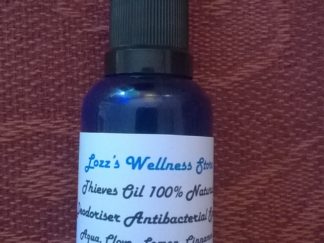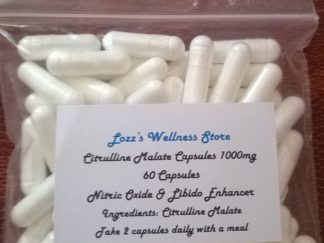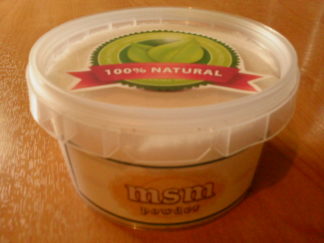Description
What is MSM ?
MSM (Methylsulphonylmethane) is a naturally occurring organic sulphur compound found in all living plant and animal tissues. It is essential for all bodily systems and normal organ functions. Since naturally occurring MSM is easily destroyed by food processing and constant utilization and excretion by the body, supplementation may be necessary to meet bodily requirements.
Sulphur is found in every cell in the body. It is structurally and functionally important to 150 compounds within the body, including tissues, enzymes, hormones, antibodies and antioxidants. Organic sulphur is known for its anti-inflammatory and circulation enhancing properties. The link between MSM and organic sulphur may explain the positive health benefits one receives after incorporating MSM into the diet.
Most health experts are familiar with dimethylsulphoxide, commonly known as DMSO. Thousands of studies have documented DMSO’s anti-inflammatory and circulation enhancing properties in treating a wide variety of medical conditions. MSM, methylsulphonylmethane, is a close chemical relative and the simplest organic dialkylsulphone which is emerging as one of the safest and most effective compounds in the support and maintenance of good health and vitality. Where DMSO was noted for bad breath and dry itchy skin (often experienced from ingesting too much yellow sulphur), MSM seems to provide all the benefits and advantages without the troublesome side effects of its predecessor.
MSM is a snow white, crystalline, water soluble, odorless and almost tasteless powder. It is neither a drug or food additive but what could be termed ‘a nutritional mineral’, such as sodium or sulphur required by the body for life processes.
MSM is an essential nutrient that has often been overlooked. According to Mr. Herschler, it is ‘shy, evasive, and escape-prone’. While not a problem within the marine life food chain, there is a problem within the terrestrial environment where it can be driven out of any food, plant, fish, meat, fruit or milk by even moderate processing including heating or drying.
MSM is the stable end-product of the methyl-S-methane series of compounds that provide all life with a dominant amount of bio-available sulphur. Together with its precursors, MSM is abundant in both the food chains of land and sea.
Sulphur is one of the essential minerals, ranked as a macronutrient in the vertebrate diet. Earlier methionine work and ongoing MSM research indicates that it is the structure of the sulphur donor molecule, not the amount of sulphur assayed in the diet of an animal or plant that is critical. The body must receive sulphur in the form of a sulphur donor molecule since it cannot assimilate elemental, yellow sulphur into the body.
The list of sulphur uses in the body is extensive. It includes hair, nails and skin, connective tissue and enzymes, hormones and immunoglobins. Without adequate and properly delivered sulphur , life functions as we know them would cease or be greatly inhibited. Without adequate sulphur tie-bars (-S-S- or disulphide bonds) of connective tissue, the body would be reduced to a pool of liquid protoplasm. Experimental findings suggest that MSM has a biological role as a cell wall stabilizing factor.
MSM has been chemically present on Earth for a very long time. During the development of all higher life-form genetic codes (and in-vivo synthesis so directed), three nutrients were always present; water, sodium chloride and MSM. MSM was a factor in the diets of our ancestors as far back as the middle ages. Since most modern-day diets in developed countries include a considerable amount of processed foods. MSM is normally present in very small quantities or missing altogether.
MSM Supports Multiple Structures and Functions in the Body.
Allergies: MSM is said to help fortify the body’s natural barriers against allergens. Oral MSM helps in the alleviation of allergic response to pollen and foods. Sulphur plays a major role in detoxification and elimination of free radicals. It also assists the integrity of the mucous membrane tissues.
Respiratory System: MSM helps strengthen the lungs, possibly regulating the fluid that covers the surface of the airways. It may provide relief from the symptoms of lung dysfunction by the plasticizing effect on the membranous surface of the lung involved in gas exchange.
Carbohydrate Metabolism: Sulphur is needed to produce insulin and other vital components that contribute to healthy carbohydrate metabolism. MSM helps make the cells more permeable allowing them to absorb blood sugar. Alpha Lipoic Acid, a sulphur containing compound, plays a role in the generation of energy and in glucose balance.
Hair, Skin and Nails: Sulphur is necessary for the production of collagen and keratin These proteins are essential for the health and maintenance of hair, skin and nails. Collagen binds the structures of skin together while keratin is the primary component in hair, nails, skin and tooth enamel. MSM enhances tissue pliability and encourages repair of damaged skin.
Gastro – intestinal: MSM helps promote good digestive and absorption of nutrients. It helps us to utilize the food we eat. Sulphur-bearing vitamins such as thiamine prevent constipation and biotin, another B vitamin, helps to metabolize and digest starches, fats and proteins.
Bones, Joints and Ligament’s: Sulphur is critical in the formation of collagen and glucosamine- which are vital components for healthy bones, joints, ligaments and tendons. Sulphur also makes cells more permeable, allowing nutrients and fluids to flow freely through the cells and remove toxins; ultimately reducing pain and inflammation.
This article talks a lot about different uses for MSM and Vitamin C.
https://www.cancertutor.com/msm-article/
To make certain that sufficient sulphur is contained in the diet, daily supplementation is the obvious course. The following dosage will be found adequate in most cases.
Dosage: One teaspoon to 200ml of water, preferably with Vitamin C.






Simon (verified owner) –
Great value a lot of MSM for the money.